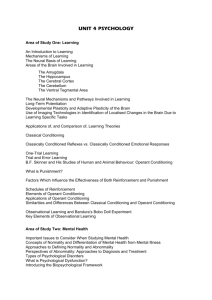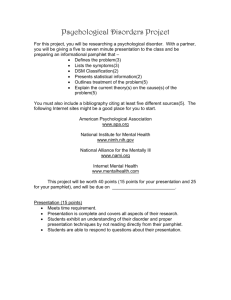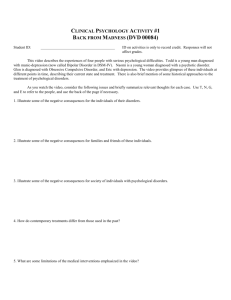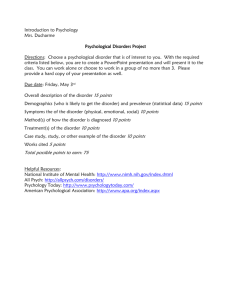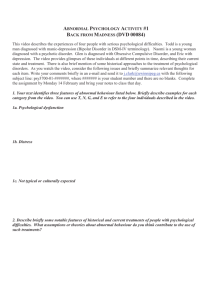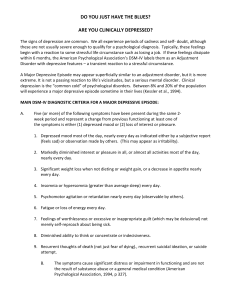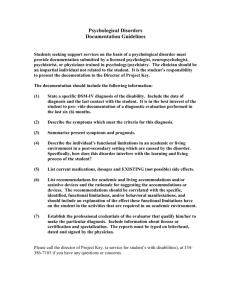2011 Unit 4 Psych Lesson Plan
advertisement
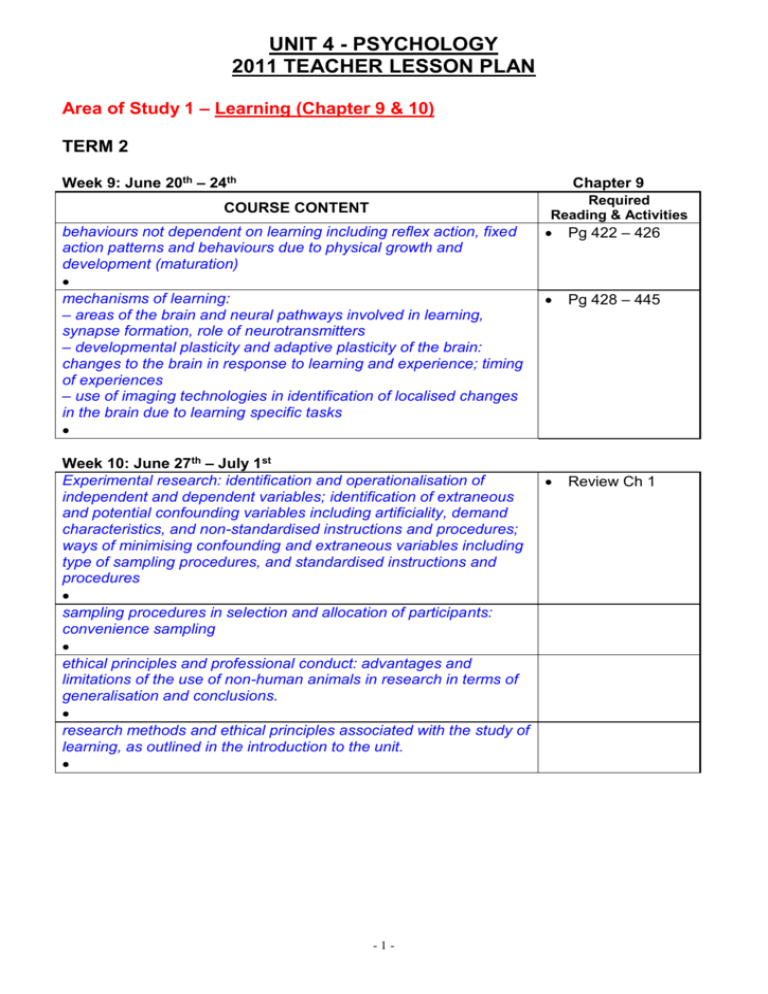
UNIT 4 - PSYCHOLOGY 2011 TEACHER LESSON PLAN Area of Study 1 – Learning (Chapter 9 & 10) TERM 2 Week 9: June 20th – 24th Chapter 9 Required Reading & Activities COURSE CONTENT behaviours not dependent on learning including reflex action, fixed action patterns and behaviours due to physical growth and development (maturation) mechanisms of learning: – areas of the brain and neural pathways involved in learning, synapse formation, role of neurotransmitters – developmental plasticity and adaptive plasticity of the brain: changes to the brain in response to learning and experience; timing of experiences – use of imaging technologies in identification of localised changes in the brain due to learning specific tasks Week 10: June 27th – July 1st Experimental research: identification and operationalisation of independent and dependent variables; identification of extraneous and potential confounding variables including artificiality, demand characteristics, and non-standardised instructions and procedures; ways of minimising confounding and extraneous variables including type of sampling procedures, and standardised instructions and procedures sampling procedures in selection and allocation of participants: convenience sampling ethical principles and professional conduct: advantages and limitations of the use of non-human animals in research in terms of generalisation and conclusions. research methods and ethical principles associated with the study of learning, as outlined in the introduction to the unit. -1- Pg 422 – 426 Pg 428 – 445 Review Ch 1 TERM 3 Week 1 (short): July 20th – 22nd applications of, and comparisons of, learning theories: – classical conditioning as informed by Ivan Pavlov: roles of neutral, unconditioned, conditioned stimuli; unconditioned and conditioned responses – applications of classical conditioning: graduated exposure, aversion therapy, flooding – trial-and-error learning as informed by Edward Lee Thorndike’s puzzle-box experiment Week 2: July 25th – 29th Continued: – three-phase model of operant conditioning as informed by B.F. Skinner: positive and negative reinforcement, response cost, punishment and schedules of reinforcement – applications of operant conditioning: shaping, token economies – comparisons of classical and operant conditioning in terms of the processes of acquisition, extinction, stimulus generalisation, stimulus discrimination, spontaneous recovery, role of learner, timing of stimulus and response, and nature of response (reflexive/voluntary) Week 3: August 1st – 5th Continued: – one-trial learning with reference to taste aversion as informed by John Garcia and Robert A. Koelling (1966) – observational learning (modelling) processes in terms of the role of attention, retention, reproduction, motivation, reinforcement as informed by Albert Bandura’s (1961, 1963a, 1963b) experiments with children – insight learning as informed by Wolfgang Kőhler – latent learning as informed by Edward Tolman Week 4 : August 8th – 12th the extent to which ethical principles were applied to classic research investigations into learning including John Watson’s ‘Little Albert’ experiment -2- Chapter 10 Pg 452 – 478 Pg 479 – 505 Pg 506 – 529 Review Pg 467469 UNIT 4 - PSYCHOLOGY 2011 TEACHER LESSON PLAN Area of Study 2 – Mental Health (Chapters 11 -14) Week 5: August 15th – 19th concepts of normality and differentiation of mental health from mental illness use of a biopsychosocial framework (the interaction and integration of biological, psychological and social factors) as an approach to considering physical and mental health Week 6: August 22nd – 26th systems of classification of mental conditions and disorders: underlying principles of classification; strengths and limitations of discrete categorical (DSM-IV and ICD-10) and dimensional (graded and transitional) approaches to classification of mental disorders research methods and ethical principles associated with the study of mental health, as outlined in the introduction to the unit. Week 7: August 29th – Sept 2nd application of a biopsychosocial framework to understanding the relationship between stress and physical and mental wellbeing: – physiological and psychological characteristics of responses to stress including fight-flight response, eustress and distress; strengths and limitations of Selyes’ General Adaptation Syndrome – psychological determinants of the stress response; strengths and limitations of Richard Lazarus and Susan Folkman’s Transactional Model of Stress and Coping Chapter 11 Pg 541 – 553 Pg 554 – 557 Pg 558 – 577 Review Ch 1 Chapter 12 Pg 582 – 601 Week 8: Sept 5th – 9th Continued: – social, cultural and environmental factors that exacerbate and alleviate the stress response – allostasis (stability through change brought about by the brain’s regulation of the body’s response to stress) as a model that integrates biological, psychological and social factors that explain an individual’s response to stress – strategies for coping with stress including biofeedback, meditation/relaxation, physical exercise, social support -3- Pg 602 – 624 Week 9: Sept 12th – 16th Chapter 13 application of a biopsychosocial framework to understanding and Pg 630 – 666 managing simple phobia as an example of an anxiety disorder: – the interaction between biological, psychological and socio-cultural factors which contribute to an understanding of the disorder and its management – biological contributing factors: role of the stress response; role of the neurotransmitter gammaamino butyric acid (GABA) in the management of phobic anxiety – psychological contributing factors: psychodynamic, behavioural and cognitive models; the use of psychotherapies in treatment including cognitive behavioural therapy (CBT), systematic desensitisation and flooding – socio-cultural contributing factors: specific environmental triggers such as being bitten by a dog; parental modelling and transmission of threat information Week 10: Sept 19th – 23rd Chapter 14 application of a biopsychosocial framework to understand a mental Pg 674 – 725 disorder and its management Mood disorder: major depression – the interaction between biological, psychological and socio-cultural factors which contribute to an understanding of the disorder and its management – biological contributing factors: role of genes in contributing to the risk of developing major depression; roles of the neurotransmitters serotonin and noradrenaline in major depression; the function of antidepressant medication in management – psychological contributing factors: learned helplessness; stress; the use of psychotherapies in management including cognitive behaviour therapy and psychodynamic psychotherapy – socio-cultural contributing factors: abuse, poverty, social isolation and social stressors as risk factors; support factors including family and social networks and recovery groups TERM 4 Week 1 : Oct 10th – 14th Exam Preparation Revision Week 2: Oct 17th – 21st Exam Preparation Revision Week 3: Oct 24th - 28th Exam Preparation -4- Revision
